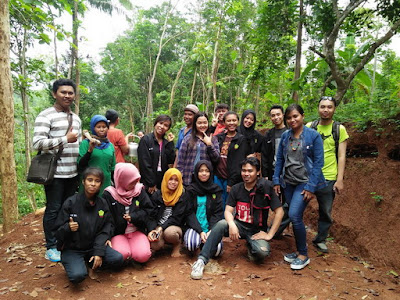Sunday, 31 July 2016
by adminstube
 Started from renewable energy training (07/2016), which taught how to process organic waste into bio-briquette, she made her activity. On Sunday, July 30, 2016, a follow up group of bio-briquette was invited to share skills in making bio-briquette among the residents of Salam village at Patuk, Gunungkidul, Yogyakarta. Two students from Institute of Technology in Yogyakarta, namely Tamjos (faculty of energy) and Alvon (environmental engineering) were interested to fulfill the invitation and share their skills to them.
Started from renewable energy training (07/2016), which taught how to process organic waste into bio-briquette, she made her activity. On Sunday, July 30, 2016, a follow up group of bio-briquette was invited to share skills in making bio-briquette among the residents of Salam village at Patuk, Gunungkidul, Yogyakarta. Two students from Institute of Technology in Yogyakarta, namely Tamjos (faculty of energy) and Alvon (environmental engineering) were interested to fulfill the invitation and share their skills to them.
by adminstube
Making Bio-briquette
at Salam Village
Field Lecture (KKN) is a program for students to apply their knowledge and skills in their daily life and society. One activist of Stube-HEMAT Yogyakarta, Elisabeth Uru Ndaya, a student of English Education at University of Sarjanawiyata Tamansiswa took part in the program since mid of July until the end of August 2016. Some of the programs conducted during her KKN resemble with activities she had got from Stube-HEMAT. She conducted programs of Field Lecture on renewable energy and health.
 Started from renewable energy training (07/2016), which taught how to process organic waste into bio-briquette, she made her activity. On Sunday, July 30, 2016, a follow up group of bio-briquette was invited to share skills in making bio-briquette among the residents of Salam village at Patuk, Gunungkidul, Yogyakarta. Two students from Institute of Technology in Yogyakarta, namely Tamjos (faculty of energy) and Alvon (environmental engineering) were interested to fulfill the invitation and share their skills to them.
Started from renewable energy training (07/2016), which taught how to process organic waste into bio-briquette, she made her activity. On Sunday, July 30, 2016, a follow up group of bio-briquette was invited to share skills in making bio-briquette among the residents of Salam village at Patuk, Gunungkidul, Yogyakarta. Two students from Institute of Technology in Yogyakarta, namely Tamjos (faculty of energy) and Alvon (environmental engineering) were interested to fulfill the invitation and share their skills to them.
At nine o'clock in the morning, at the same time with village voluntary work, they were enthusiastic to share a simple way to make bio-briquette. Tamjos told the techniques and Alvon did the process of making bio-briquette. The people looked so enthusiastic to join the discussion, especially women. They felt fine and not disgust when stirring charcoal dough without gloves.
One important question expressed by Mrs. Prapti, one of the residents there, "Why should we bother to make bio-briquette, we still have wood charcoal?" Tamjos wisely answered, "Yes, but all of us need to know that charcoal is derived from wood and if we use it, it is not environmentally friendly. If we cut trees as charcoal everyday, the forest will be barren. The material of bio-briquette is originated from trees, but the dry falling leaves, twigs, tree stems, or branches. Charcoal originated from these materials that can be used as bio-briquette." Tamjos added, "Well, when we are accustomed to use bio-briquette, we do not need to worry of the raising price of LPG, kerosene or firewood."
At the end of the discussion, they prepared hot tea and fried food while interspersed with laughter when a man chattering, "Please visit this place frequently, because we have a lot of natural scenes and local arts which are not found in Jogja." The two students replied “Okay.”
Congratulations friends, you have managed to make friendship with local people and keep to spread the spirit of renewable energy. (SRB).
Web Archive
2025 (15) 2013 (20)
2012 (12)
2011 (2)
2010 (18)
Total: 483
Youtube Channel
Lebih baik diam dari pada Berbicara Tetapi tidak ada Yang Di pentingkan Dalam Bicaranya
-->




